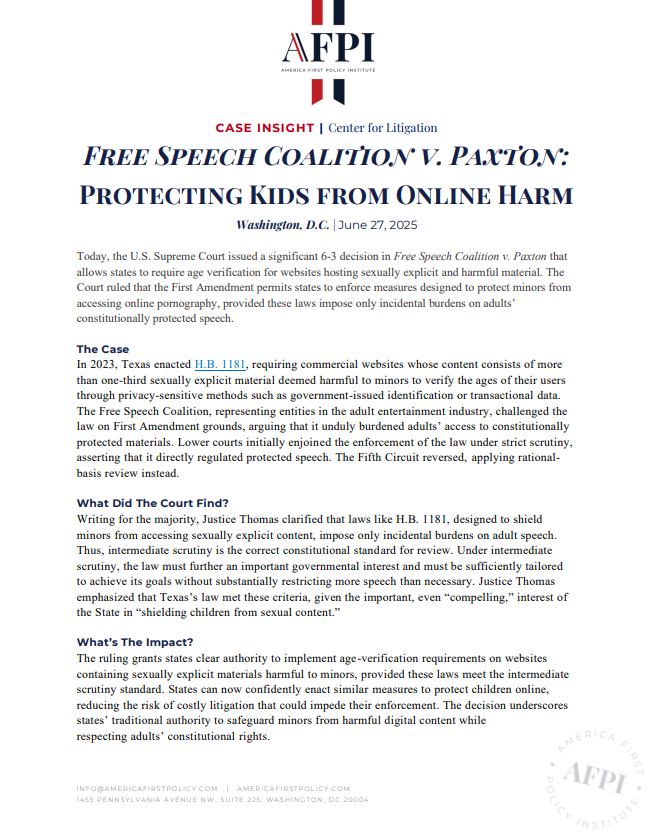Free Speech Coalition v. Paxton: Protecting Kids from Online Harm
Today, the U.S. Supreme Court issued a significant 6-3 decision in Free Speech Coalition v. Paxton that allows states to require age verification for websites hosting sexually explicit and harmful material. The Court ruled that the First Amendment permits states to enforce measures designed to protect minors from accessing online pornography, provided these laws impose only incidental burdens on adults’ constitutionally protected speech.
The Case
In 2023, Texas enacted H.B. 1181, requiring commercial websites whose content consists of more than one-third sexually explicit material deemed harmful to minors to verify the ages of their users through privacy-sensitive methods such as government-issued identification or transactional data. The Free Speech Coalition, representing entities in the adult entertainment industry, challenged the law on First Amendment grounds, arguing that it unduly burdened adults’ access to constitutionally protected materials. Lower courts initially enjoined the enforcement of the law under strict scrutiny, asserting that it directly regulated protected speech. The Fifth Circuit reversed, applying rational-basis review instead.
What Did The Court Find?
Writing for the majority, Justice Thomas clarified that laws like H.B. 1181, designed to shield minors from accessing sexually explicit content, impose only incidental burdens on adult speech. Thus, intermediate scrutiny is the correct constitutional standard for review. Under intermediate scrutiny, the law must further an important governmental interest and must be sufficiently tailored to achieve its goals without substantially restricting more speech than necessary. Justice Thomas emphasized that Texas’s law met these criteria, given the important, even “compelling,” interest of the State in “shielding children from sexual content.”
What’s The Impact?
The ruling grants states clear authority to implement age-verification requirements on websites containing sexually explicit materials harmful to minors, provided these laws meet the intermediate scrutiny standard. States can now confidently enact similar measures to protect children online, reducing the risk of costly litigation that could impede their enforcement. The decision underscores states’ traditional authority to safeguard minors from harmful digital content while respecting adults’ constitutional rights.
Does This Impact the America First Agenda?
AFPI has long championed that children are in need of protection from the darkest corners of the internet. Because of the ubiquitous nature of the internet and without laws like Texas HB 1181, minors are exposed today to hard-core, sexually explicit material that even adults were shielded from in prior generations. It is harmful to their psychological development as well as to their relationships with the opposite sex. Today’s ruling was a victory for federalism and for the rights of the people, through their elected representatives in state government, to declare that patently offensive websites, even if they are protected by the First Amendment, can and should remain off limits to children with simple, common-sense age verifications like a photo ID.
